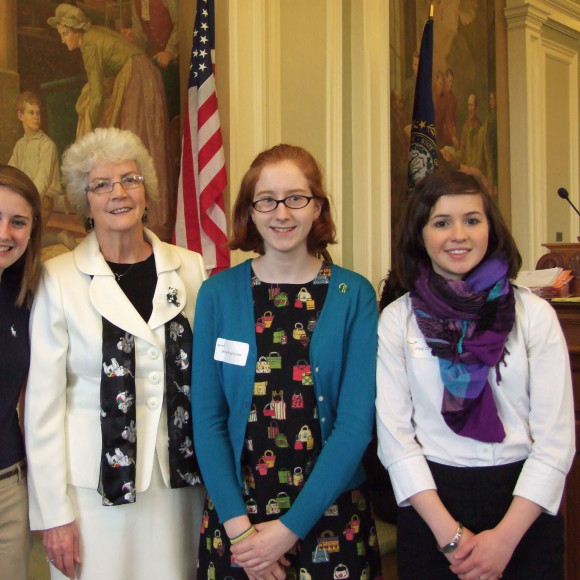Our Grantmaking
Origins of the Vermont Women's Fund
The Vermont Women's Fund, a component fund of the Vermont Community Foundation, was established in 1994 as an enduring resource for Vermont women and girls. The Fund remains the first philanthropic resource in the state dedicated exclusively to this mission. A council of women from around Vermont advises the Fund and participates in its grantmaking, fundraising, and leadership work.
The Women’s Fund works to improve the lives of young women and girls in Vermont by targeting philanthropic giving, forging statewide strategic partnerships, funding research, and supporting programs that address their fundamental economic, educational, and social needs.
What We Fund
We support programs that seek to address systemic barriers to economic well-being, and those that recognize the disproportionate impact of these barriers on women and girls by race, gender identity, sexuality, class, age, and ability.
We are also invested in the sustainability of the organizations we support and seek to determine how best our funding can contribute to long-term viability, creativity, and generative change. We award single or multi-year grants that support programmatic expenses for pilot or established programs and/or general operating costs. We consider funding proposals that supports work at any phase of development (including pilots).
Guidance for Proposals
Outcomes & Strategies
The Vermont Women’s Fund will consider general operating support and programmatic proposals, including those designed to meet essential needs and those focused on long-term structural change, that contribute to the following outcomes:
-
Make pathways to economic well-being (e.g., livable wage jobs, career development, entrepreneurship, and financial literacy) more visible, accessible, and affordable for all women and girls,
-
Invest in the economic security and career prospects of unemployed women or those earning less than a living wage,
-
Advance strategies that address systemic barriers to economic well-being and thriving in Vermont (e.g., education/training, childcare, transportation, access to health care, paid family leave, living wages, etc.), and/or
-
Enhance the capacity of the organization to achieve its mission and practice stated values.
Critical Components
Proposals that include the following components will be prioritized:
-
Desired outcomes aligned with the Fund’s mission and focus areas listed above
-
Commitment to working with women and girls who are disproportionately impacted by systemic racism and sexism (BIPOC individuals, trans women and non-binary people, women living with disabilities, older women)
-
Demonstration of how the proposed work will influence change and address systemic barriers and root causes
-
Strategies grounded in research or best practices
-
Projects that exhibit a collaborative approach
-
A clear description of the desired vision for the program at the end of the grant term, and what questions will guide reflection and evaluation
-
Regional representation across Vermont
What We Don't Fund
- Personal financial support given directly to individual women/girls
- Individuals applying for scholarships or to attend school
- Endowments
-
Campaigns to elect public officials
-
Programs with religious instruction
-
Projects that will be completed before the grant is awarded
-
Businesses, business startup funds, or loans
-
Fundraising events
-
Organizational debt
-
Capital campaigns
-
Indirect expenses over 10% of the project budget
Who May Apply
Grant applications will be accepted from organizations located in or serving the people of Vermont. Organizations must be tax-exempt under Section 501(c)(3) of the Internal Revenue Code or be a public agency, school, or municipality in the state of Vermont. Nonprofit organizations or community groups who do not have 501(c)(3) status may apply for grant awards if another eligible organization acts as a fiscal sponsor.
No person in the United States shall, on the basis of actual or perceived race, color, religion, national origin, sex, gender identity (as defined in paragraph 249(c)(4) of title 18, United States Code), sexual orientation, marital or parental status, political affiliation, military service, physical or mental ability be excluded from participation in, be denied the benefits of, or be subjected to discrimination under any program or activity funded in whole or in part with funds made available (meaning any funds having a competitive application process) by the Vermont Community Foundation, and any other program or activity funded in whole or in part with funds appropriated for grants, cooperative agreements, and other assistance administered by the Foundation.
Grant applicants must employ staff and provide services without discrimination on the basis of race, color, religion, national origin, sex, gender identity (as defined in paragraph 249(c)(4) of title 18, United States Code), sexual orientation, marital or parental status, political affiliation, military service, physical or mental ability.
Application Process
All Applications must be submitted electronically through the Vermont Community Foundation’s Online Grants Manager. Visit the Online Grant Center to learn how to use the Grants Manager, including accessing your existing account or registering for the first time.
To help you prepare, click here to preview a sample of the application. Please note that this is a PDF sample and not the actual application. To view and begin working on the application, login to the Online Grants Manager (OGM), which can be accessed at www.vermontcf.org/OGM.
If you have questions about this process or would like to discuss an idea, please contact our grants team at grants@vermontcf.org or 802-388-3355 opt. 6.
Grant Size
Grants of up to $15,000 will be awarded.
Deadline and Notification
Applications will be accepted between January 9 - March 19, 2024. Applications must be received by 5PM on Tuesday, March 19 in order to be considered. Applicants will be notified of final decisions in May 2024.

